The Ultimate Guide to Round Cut Diamonds
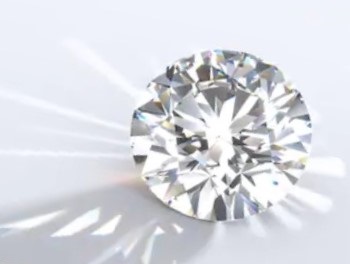
The round cut diamond is the most popular shape for engagement rings and it accounts for more than 70% of the world’s polished diamond inventory. But why are round brilliant cut diamonds so popular?
Well, that’s because the round brilliant cutting style is able to optimize light reflections to make it more brilliant and sparkly than any other diamond shapes. Also, their circular outline makes it a suitable shape for different types of finger size/hands and ring settings.
In this comprehensive guide, I’m going to show you exactly what to look out for and walk you through the proven method of picking a beautiful round cut diamond based on tangible data.
In fact, I personally use the same exact process when I’m buying a diamond and you can even see the full details of the engagement rings (with videos) I recently purchased. Let’s get started…
Here is a list of topics we will be covering:
- Cut Quality: Recommended Proportions for Round Cut Diamonds
- What is the Best Color Rating to Choose for a Round Diamond Ring?
- Recommended Clarity Grades for Round Brilliant Cut Diamonds
- How Much Does a Round Brilliant Cut Diamond Cost?
- My Personal Experiences of Buying Round Diamond Rings
- Best Engagement Ring Setting Designs For Round Cut Diamonds
- Summary And Recap: Best Places to Buy a Round Diamond Ring
Cut Quality: Recommended Proportions for Round Cut Diamonds
When choosing a round diamond, cut is the most important attribute of the 4Cs that you need to pay attention to. This is because cut quality determines a diamond’s sparkle factor and has the biggest impact on its visual appearance.
When gemological labs like GIA grade round diamonds for cut quality, they assign ratings that range from Excellent, Very Good, Good, Fair and Poor. For the record, I only recommend shopping for diamonds with an Excellent cut grade (or Ideal if graded by AGS).
Now, the problem with relying solely on the cut rating in the grading report is that it is very broad. If you want to separate the wheat from the chaff and pick out the best of the best round diamonds, this is where the science of cut proportions and light physics come into play.
Below is a table of ideal proportions that I personally use as a guideline to filter and find super ideal cut diamonds.
| Excellent | Very Good | Good | Fair/Poor | |
|---|---|---|---|---|
| Table % | 54% – 57% | 53% – 60% | 51% – 62% | Outside Ranges |
| Depth % | 61.0% – 62.5% | 60.0% – 63.0% | 59% – 64% | Outside Ranges |
| Polish/Symmetry | Excellent – Very Good | Good | Outside Ranges | |
| Crown Angle | 34.0 – 35.0° | 33.0 – 36.0° | 32.0 – 37.0° | Outside Ranges |
| Pavilion Angle | 40.6 – 41.0° | 40.2 – 41.4° | 39.8 – 41.8° | Outside Ranges |
| Girdle Thickness | Thin – Slightly Thick | V. Thin – Thick | Outside Ranges | |
| Culet Size | None | Very Small | Small | Outside Ranges |
* Note: This is a set of proven proportions that are far stricter than those utilized by GIA during their grading process. After narrowing down your diamond choices, you should use tangible data like H&A and ASET images to help you make a final decision.
From experience, round diamonds with depth percentages between 61-62.5%, table sizes between 54-57% will have the ideal face up size for their carat size. In conjunction with crown angles between 34.0°-35.0° and pavilion angles between 40.6°-41.0°, the diamond will display the best balance of brilliance and fire.
To help you get a better idea of cut quality, I’ve handpicked an ideal cut diamond with top notch performance and compared it against a mediocre GIA triple excellent diamond. Visually, you should be able to see a big difference in terms of contrast patterning and light return.
I also want you to click on both links below to view the diamond videos and interact with them for yourself.
What is the Best Color Rating to Choose for a Round Diamond Ring?

GIA diamond color chart comparison of D to K colors in the face up view.
Due to their facet pattern and cutting style, round diamonds are able to reflect more light than any other diamond shape. This means that the color tint of a round diamond can be concealed by the sparkle and you don’t need a high color grade to get an icy white appearance.
While D-F (colorless) diamonds ensure a cool, icy appearance, they are highly sought after and come at a price premium. As a practical shopper, the best color rating to get would be a G color as you avoid the premiums while getting a white looking diamond.
Now, I do want to point out that choosing a diamond’s color is often based on personal preference. If you aren’t sure about what you prefer, check out the comparison video below of D, H and K color diamonds in real world environments.
Can you see color differences between these 3 rings easily or is it difficult to do so?
While most consumers may like white looking diamonds, there are plenty of people who love warm-toned diamonds on the lower spectrum of the color scale.
This is especially true if you are looking for vintage style engagement rings or using yellow/rose gold metals for your setting. Going down the color scale for a J or K diamond would be perfectly fine as the warm tint complements the style of the engagement ring.
Recommended Clarity Grades for Round Brilliant Cut Diamonds
GIA grades diamond clarity on a scale of FL to I3 with flawless being the highest grade and Included 3 being the lowest. One of the most common mistakes beginners make is the misconception that a higher clarity grade will equate to better sparkle and brilliance.
The truth is far from that as the majority of eyeclean VS2 diamonds will look identical to an internally flawless diamond when seen with the naked eyes. If you don’t need a symbolic D/IF rating for your diamond, you can save a lot of money simply by buying an eyeclean SI1 or VS2 diamond.
In general, most SI1 and VS2 diamonds will be eyeclean and I would recommend shopping in these grades to get the best value for money. The key is to look for eye-clean stones where you will not be able to see inclusions without a 10X loupe.
Check out the 2 examples below and see if you can tell which diamond is eyeclean and which isn’t.
How Much Does a Round Brilliant Cut Diamond Cost?
Well, it depends.
The price of a round diamond is mainly determined by factors such as cut, color, clarity and carat size. Compared to the other diamond shapes, the round cut is relatively the most expensive because they require more rough diamond to be polished away during the cutting process.
To give you some idea of how much a round diamond costs, I’ve compiled a price comparison table using 1 carat sized round diamonds with different specifications. Do take note that diamond prices would also be affected by a slew of other factors such as fluorescence or cut precision.
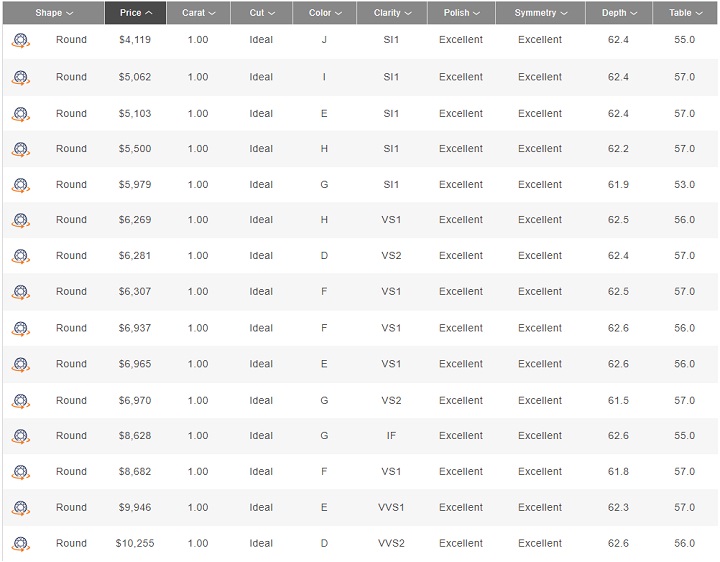
Price chart comparison of GIA certified 1ct round shaped diamonds.
From the table above, you can see that the price of a 1 carat round diamond can vary significantly between $4,000 to $10,000 depending on the color/clarity ratings. A diamond with high end specifications can easily cost 2 to 3 times more than one with lower color/clarity ratings.
One common mistake that first time shoppers make is that they think a diamond with D/IF ratings would have better brilliance and fire compared to another diamond with lower color/clarity.
That’s a big misconception. In fact, a well cut G/SI1 diamond can look identical to a D/IF diamond in the face up view even though it costs less than half the price.
Here’s a test you can do for yourself and see if you can notice differences between gradings easily. Below is a side by side video comparison of a D/VVS1 diamond against an I/SI1 diamond and you can use it as a gauge for your visual acuity.
My Personal Experiences of Buying Round Diamond Rings
Over the years, I’ve bought a number of diamond rings for my wife and even helped my family members purchase their engagement rings. Using the same exact guidelines above, the process of shopping for a diamond ring is actually pretty straightforward.
The key to having an enjoyable experience is to shop at a reputable vendor that provides high quality products and service. It is also mandatory that they provide tangible information about their diamonds as it will help you make educated purchase decisions.
Before you shop, the first you should do is to work out the budget for the purchase and the ring setting design that the recipient wants. Once you have this information, you will know exactly how much budget is left over for the diamond and what you can realistically get in terms of the 4Cs.
Check out the 2 recent diamond engagement rings that I recently purchased from James Allen and White Flash. If you are interested to see how they look like in person, make sure you watch the video recordings I made of the rings.
Diamond Engagement Ring Purchased From James Allen
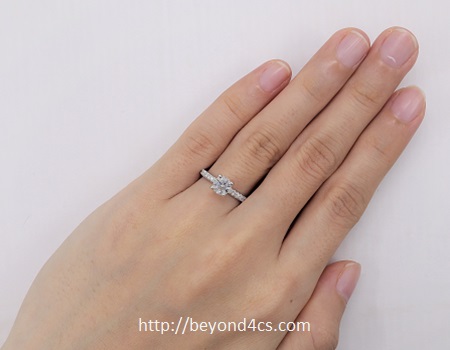
With a budget of $3,000, this well crafted pave diamond engagement ring was purchased at James Allen. An H color SI1 diamond was selected from their signature True Hearts range which consists of high performance diamonds.
The video listing made it really easy to assess eyecleanliness and the scope images provided enabled me to evaluate the diamond’s cut quality with certainty. Here are the full details of the ring:
I’ve also recorded a video of the diamond ring to show you how it looks like in real life. If you want to view more close up pictures and videos of the ring, click here to read the full review.
Designer Round Cut Diamond Ring Purchased From White Flash
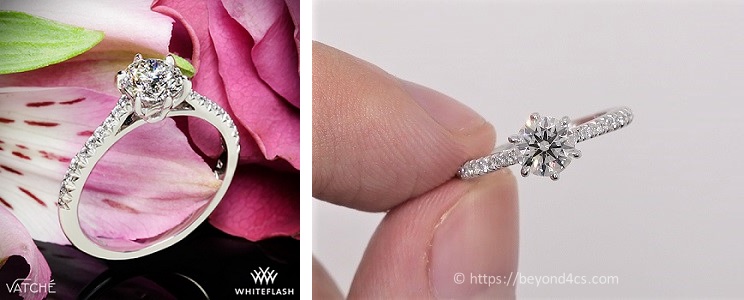
Vatche designer ring setting with super ideal cut round diamond.
This is the most recent engagement ring purchase I made from White Flash and the budget for this purchase was around $4000. For a designer and branded ring setting, the price of the ring is very affordable and offers good value for money.
The center stone that was picked was a 0.622 carat G VS2 hearts and arrows diamond and you can see full details of the diamond ring in the listings below. One of the best things about White Flash is that they curate diamonds for light performance and do the heavy lifting of finding well cut diamonds for you.
And to help you understand what you are buying, they offer tangible data like idealscope and ASET images in their listings. In fact, no other vendor comes close to offering the level of technical details for diamonds they sell.
If you are interested to see how the diamond ring looks like and want to review the craftsmanship in detail, you can check out the comprehensive write up here. You can also check out the video I made when I examined the diamond ring under various lighting environments:
I’ve also recorded a video of the diamond ring to show you how it looks like in real life. If you want to view more close up pictures and videos of the ring, click here to read the full review.
Best Engagement Ring Setting Designs For Round Cut Diamonds
Round diamonds are extremely versatile and can go well with almost any type of ring setting design due to their geometric shape. Since the round shape is the most popular choice for engagement rings, there is no lack of designs offered by jewelers.
When it comes to ring settings, one of the key things I look out for is workmanship quality. This is because better craftsmanship in the setting would not only maximize the aesthetic beauty of the ring, it would also provide additional security for your diamond.
Here are some of my favorite ring designs and I hope it can provide you with ideas for finding your perfect diamond ring.
This diamond ring features a cushion shaped halo that offers extra brilliance and fire to the round center stone.
This luxurious triple halo ring offers the ultimate sparkle and combines rose gold and white gold in the shanks.
This beautiful 6-prong ring is one of the best Tiffany inspired designs in the market.
This gorgeous Verragio ring is full of intricate details and has rose gold metal wrappings on the shanks.
This elegant cathedral solitaire ring features a streamlined knife edge shank that tapers around the finger.
This stunning 3 stone ring features an open basket that is flanked with 2 pear shaped diamond side stones.
Summary And Recap: Best Places to Buy a Round Diamond Ring
If you are a first time shopper, don’t let a jeweler mislead you by overcomplicating the buying process. It’s really quite straightforward and there are only a few things you need to keep in mind: proportions & tangible light performance data.
To recap, here are my recommended guidelines for buying a round cut diamond:
Depth Percentage: 61.0% to 62.5%
Table Size: 54.0% to 57.0%
Crown angles: 34.0° to 35.0°
Pavilion angles: 40.6° to 41.0°
Lower Girdles: 75% to 80%
Star Facets: 50% to 55%
Polish/Symmetry: Excellent
Color: G or better
Clarity: SI1 or better
Grading Report: GIA or AGS
As I said earlier, these proportions and parameters should only serve as a guideline to help you narrow down your selections. It is important that you make your buying decision based on tangible cut performance data like ASET/Idealscope images and magnified videos.
If you are looking for a super ideal cut diamond that’s full of sparkle and life, the best places to shop for them are White Flash, James Allen and Brian Gavin. Not only do these vendors curate their signature diamonds with strict standards, they also provide videos and performance data readily to help you assess their diamonds.
I’ve personally mystery shopped and purchase a number of engagement rings from these vendors and I can tell you the shopping experience is really easy and straightforward. All 3 vendors offer excellent customer support and consumer-friendly sales policies so that you shop with zero-risks.
I hope this comprehensive guide has been useful to help you pick out your dream diamond engagement ring. If you need help or advice, simply drop me an email or leave a comment below to get in touch.
Related Articles
Leave A Comment

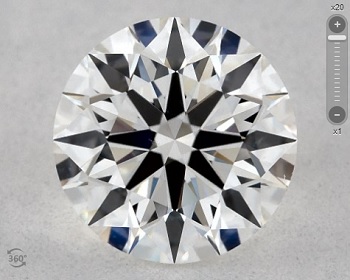
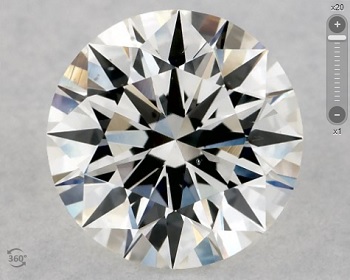
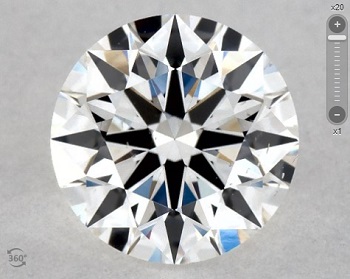
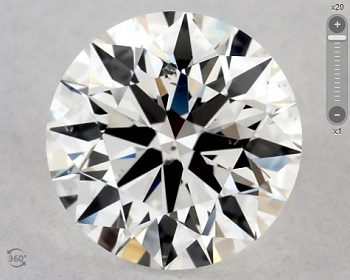
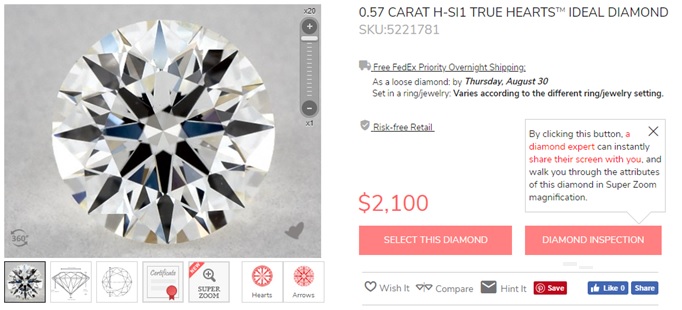
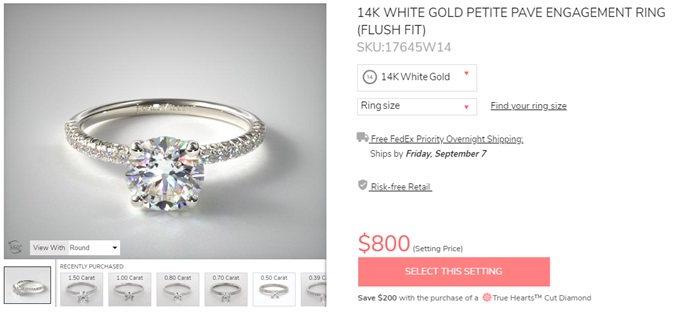
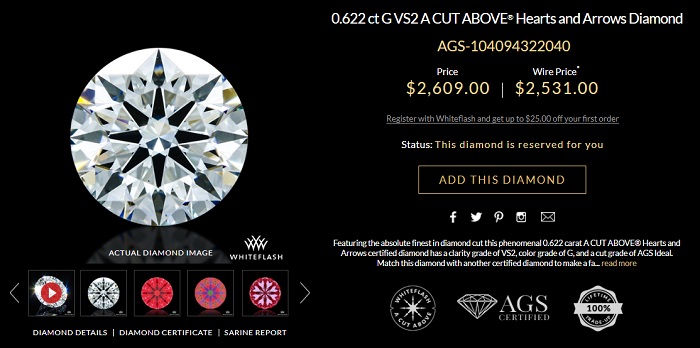
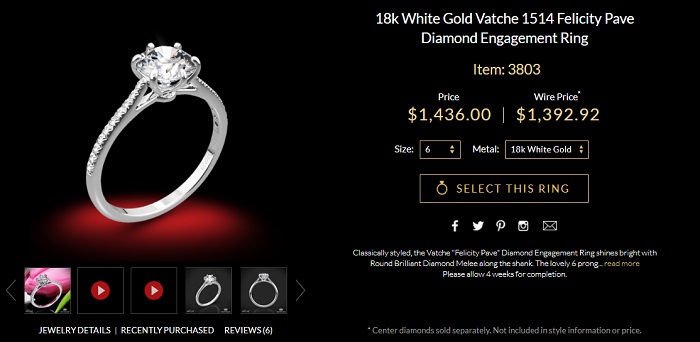

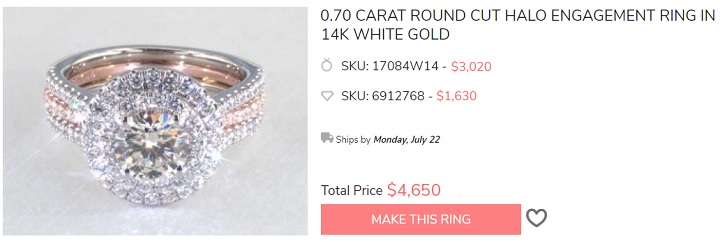
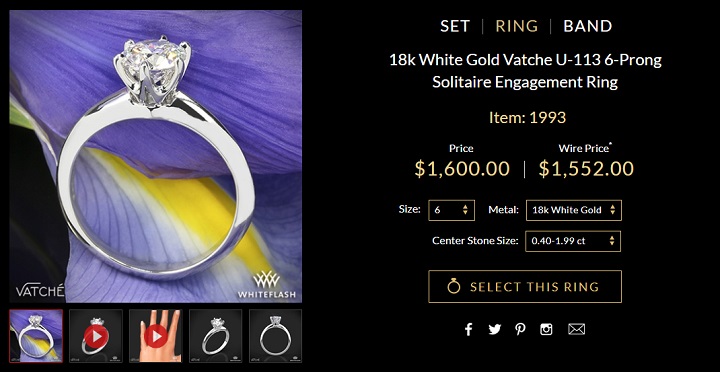
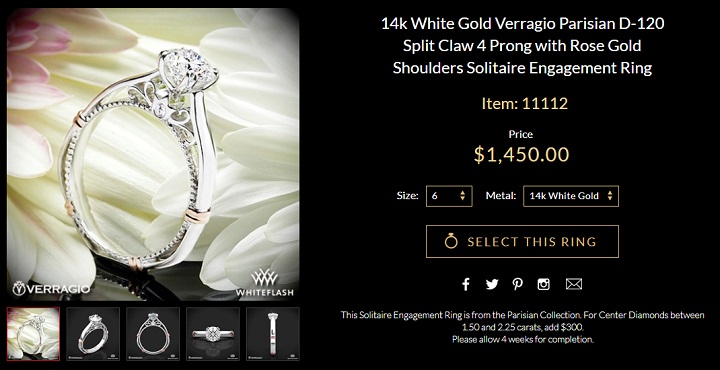
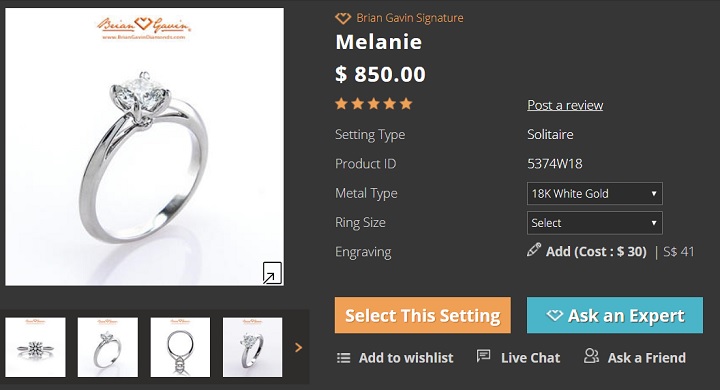
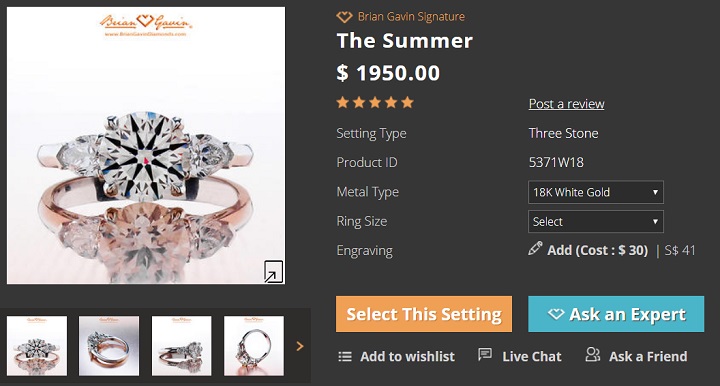
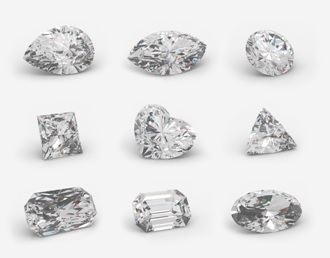

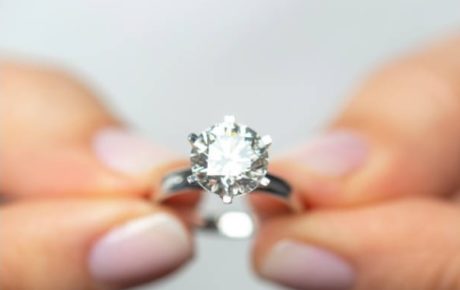
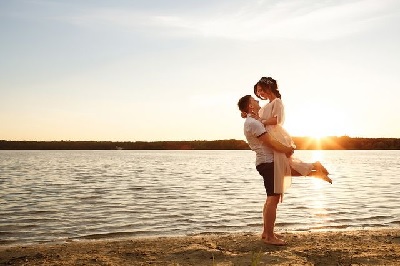






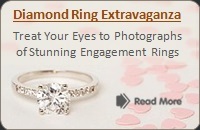
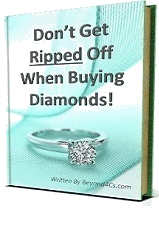

40 Comments
Hi Paul,
What do you think about this round? https://www.jamesallen.com/loose-diamonds/round-cut/1.10-carat-h-color-vvs2-clarity-excellent-cut-sku-887287
I used your table and depth proportions but I am not sure about if the fluorescence and cutlet being pointed is desireable. To my untrained eye, I believe the “arrows” are satisfactory. Can you give me an opinion?
Great site by the way!
Steph
The diamond is cut decently. However, it’s not a stone I would buy because of its IGI report. Most consumers get suckered in because of the seemingly lower prices. With an unreliable grading report, the color and clarity will be overstated and you will actually end up paying more for inferior quality.
Hi Paul,
What are your thoughts buying a diamond online and a setting at a retailer specifically Helzberg diamonds?
How does the cleaning/maintenance and fitting work seems like it would create complications if anything happens to the ring?
Should I still purchase the warranty on the setting?
Any feedback would be highly appreciated.
Read this: https://beyond4cs.com/reviews/
Thank you for the great information on your website. Both from content and organization perspectives, I couldn’t ask for anymore. I think at this point I might have gone through at least 75% of the material and that took a while to digest! I am writing to get your opinion on the following diamond from Brilliant Earth (GIA report within the product description).
I would greatly appreciate your opinion on it before making such a big (and expensive) purchase. I tried to follow the guidelines you recommended across the various parameters. Here is a quick snapshot of the diamond specs:
-Cut: Round Brilliant (Super Ideal Cut)
-Clarity: VS2
-Color: I
-Carats: 1.7
-HCA score: 2.0 (Very Good)
-Girdle: Slightly Thick – Slightly Thick
Key Questions:
-Are there any potential concerns you would have with this stone?
-Are there better trade-offs I can make across these parameters to get an optimal stone for under $15K?
-Is the girdle for it an issue?
Additional note: I went with your suggestion against the 3 stone setting ring and went with a simple design, with the aim of getting a vintage look:
http://www.brilliantearth.com/Delicate-Antique-Scroll-Diamond-Ring-White-Gold-BE141-1151554/
Any comments on this would also be much appreciated.
Thank you.
Proportions wise, the steep pavilion angle is cause for rejection of this stone. You might want to search for more options using the guidelines here: https://beyond4cs.com/shapes/round/ideal-proportions/
Thank you for the feedback!
I reviewed your ideal proportions for round diamonds and have picked another option:
https://beyond4cs.com/shapes/round/ideal-proportions/
Could you please let me know your thoughts (one last time) on the following stone?
http://www.brilliantearth.com/loose-diamonds/view_detail/2096514/
Cut: Super Ideal
Color: H
Clarity: VS2
Measurements: 7.49 x 7.44 x 4.68
Table: 56.0%
Depth: 62.7%
Crown angle: 35%
Pavilion angle: 41%
Symmetry: Excellent
Polish: Excellent
Girdle: Medium – Slightly Thick
Fluorescence: None
Numbers are only a pre-requisite to a well performing stone. The photographic image doesn’t suggest a top of the line stone. More importantly, I’m concerned about the dark inclusion smack in the middle of the table.
Understand and thank you for the valuable information.
I have reevaluated my options and have come to 2 hopefully final stones. Based on the illustrations on the GIA reports, there doesn’t seem to be clarity issues but awaiting the photos that I requested.
Any concerns and/or preference you may have between these 2 stones would greatly appreciated:
Option 1:
http://www.brilliantearth.com/loose-diamonds/view_detail/2111939/
Option 2:
http://www.brilliantearth.com/loose-diamonds/view_detail/1846070/
Proportions wise, both diamonds are pretty much on par and look good. Photographs would be more important to discern cut quality between the 2.
Hey Paul I read a lot on your web site and see a lot of great info. I wanted to see what you think of this diamond, it is a tough process.
http://www.whiteflash.com/loose-diamonds/round-cut-loose-diamond-3675410.htm
Thanks,
Nick
Paul,
I am curious what you think of this diamond, thought I posted the question already, but could not find it on the site. Love the info on the site. And by the way, what’s the difference between 57 facets and 58 facets? I see some people referring to round diamonds with fifty-eight facets. Thanks!
It’s a well cut diamond that offers good value for money.
Sometimes, you might hear people describe a round diamond as a 57 facet cut while sometimes, other people may say that it has 58 facets.
Well, it turns out that they are actually referring to the same thing. Most modern round diamonds are comprised of 57 facets. This can be broken down into the following:
1 table facet
8 star facets
8 crown facets
16 upper girdle facets
16 lower girdle facets
8 pavilion main facets
If a culet (pointed tip had been polished to a flat surface) is present, this adds an additional surface which makes it a total of 58 (57+1) facets. If you see the following culet descriptions on your grading report: “None” or “Pointed”, it means that the diamond only has 57 facets.
Hi Paul,
Thanks for the wealth of information you have provided on your site. I’ve looked at many different stores like Zales for their signature celebration diamonds and even at Jareds. Seems like every big brand store and even the online stores have signature diamonds that are more expensive than other stones they have in store. Are branded diamonds always better?
Also, can you let me know your thoughts on this diamond?
https://www.jamesallen.com/loose-diamonds/round-cut/1.80-carat-i-color-vs1-clarity-ideal-cut-sku-2101297
First of all, the JA diamond is well cut for light performance and is eyeclean. Good job in picking this stone out!
When it comes to branded diamonds like Super Ideal – True Hearts – Signature Series and other fancy-sounding names, it can be easy to be suckered in by marketing campaigns. Whether the diamonds are marketed to have better cut properties or unique facet structures, one thing certain about branding is that it helps the product to stand out from the competition.
When I first got into the foray of hunting for a proposal ring, I was introduced to some supposedly “high quality” stones that were termed as super ideal cut or signature series.
This really confused me.
What is a super ideal cut diamond? What is a signature diamond? How different are they from the usual ones you see inside the store? Are branded jewelry and diamonds really “better”? This confusion was further compounded because every jewelry store had their own in-house specialty stones!
When I took a look at the grading certificate of these diamonds, the cut grades were still labeled as “Excellent” (for GIA reports) and “Ideal” (for AGS report). If they were classified under the same grade like other diamonds, what made them so different or special (besides the staggering price differences between them and the non-labeled diamonds)?
It was only later that I found out these terms were usually nothing more than fluffy advertising gimmicks.
But what’s the real reason behind the pricing difference?
I receive emails from readers all the time with regards to the nomenclatures used by different jewelers. Questions like: “I was recommended to buy this super ideal princess cut diamond by XXX jeweler. What are your thoughts about the diamond and should I take my jeweler at his words that it offers the best value?”
“What is a super ideal cut diamond?” or questions like “Hey Paul, I been looking online for diamonds and come across some that are classified as a signature series by the jeweler. What does this mean? Does this mean that the jeweler has their own in-house cutter who polishes the diamond? I don’t see a super ideal cut grade in the certification. Could you explain this to me?”
In my opinion, a diamond is just a diamond. Jewelers try to use fanciful names to make their diamonds sound different from the competition. That’s basic business marketing – 101.
Let me reveal an insider secret to you… Most of the diamonds you see in signature lines are basically sourced from the same diamond cutting facilities located in India and the United States. What happens here is that the vendor simply applies a filter and select diamonds within a specific range of proportions.
This filter defines the diamond’s appearance and represents the jeweler’s “special inventory” since they had gone through a round of “pre-qualification” process.
The terms ‘super ideal’ and ‘hearts and arrows’ technically do not exist. In nowhere does it state on a GIA grading report that a diamond has super ideal optics or hearts and arrows. These terms are merely invented by jewelers to label diamonds they had sieved out with better performance.
Also, you need to understand that a diamond graded as an excellent cut by GIA may have totally different optical properties from another diamond which has the same cut grade.
So, is the work all cut out for you?
In a nutshell, when we talk about branded jewelry, it generally means that the work to filter out the better performing stones had been done on your behalf. Yet, herein lies the problem itself in “branded” jewelry. What set of rules or conditions does the vendor applies when classifying the diamonds? Every different vendor has their own set of methods to labeling their diamonds and who should you trust or think you can rely on?
My answer to the above is: Trust yourself.
Don’t let the sales staff talk you into a purchase you are not sure of especially if you are buying from a local brick and mortar store. To help yourself in choosing a diamond, it is better to educate yourself instead of relying blindly on the sales staff for recommendations. This step by step article on how to choose a diamond will teach you exactly how to do that.
WhiteFlash.com and BrianGavinDiamonds.com are well-known for their ideal cut diamonds. With a perfect balance of brilliance, fire and scintillation, they are some of the most breathtaking diamonds I had ever seen.
Before I wrap things up, you might be interested to learn more about the online vendors I recommend. You can check out reviews of BrianGavinDiamonds.com and WhiteFlash.com with the following links here and here. The reason why I recommend them is that they don’t give you the usual marketing bullshit without substantiating their claims and are fine examples of companies to do business with.
Hi Paul
Based on your specifications for a round brilliant, I’ve picked this diamond out from James Allen – what do you think?
https://www.jamesallen.com/loose-diamonds/round-cut/1.03-carat-d-color-vs2-clarity-excellent-cut-sku-2134269
Thanks
It’s a decent choice. If you want a diamond with better cut quality, these would be two options I would recommend:
https://www.jamesallen.com/loose-diamonds/round-cut/1.23-carat-e-color-si1-clarity-excellent-cut-sku-2061663
https://www.jamesallen.com/loose-diamonds/round-cut/1.09-carat-d-color-vs1-clarity-excellent-cut-sku-1834553
Hi Paul,
What is your opinion on this diamond…
https://www.jamesallen.com/loose-diamonds/round-cut/1.51-carat-i-color-vvs2-clarity-very-good-cut-sku-2481809
The cert does not have a cut grade on it why is that?
It’s a terribly cut diamond and the stone’s owner didn’t send it to AGS to get a full cut grading on the stone because it will make it look bad. Dump the stone. I would recommend this stone in its place instead if you want the best sparkle and optical performance: https://www.jamesallen.com/loose-diamonds/round-cut/1.52-carat-i-color-vs2-clarity-ideal-cut-sku-1783910
Hi Paul,
Thanks for all the efforts you put into providing your expertise and guidance. Would love to have your opinion on these options or if you have other recommendations?
https://www.whiteflash.com/loose-diamonds/round-cut-loose-diamond-3788921.htm
https://www.whiteflash.com/loose-diamonds/round-cut-loose-diamond-3816361.htm
Thanks!
Ryan
Hey Ryan, both are diamonds cut with great precision and light performance. Obviously, the difference between them is sizing and pricing. That’s largely a matter of individual preferences. Both are winners. If you can afford the budget, go for the 1 carat stone because its a psychological thingy.
Hi Paul,
Thank you so much for all of the care you put into providing such detailed information. Reading and re-reading it has helped me narrow down my search. I would be very grateful for your opinion regarding my situation and setting I have chosen:
https://www.jamesallen.com/complete-ring/
1. Fiancée has brown skin and likes 18-carat gold, so from your info. I am thinking I can save money by compromising on color, maybe down to J or even K?
2. She is also from a culture (Colombia) where many people’s engagement rings do not have any diamonds, so a smaller carat will be just fine, I am thinking down to about 0.32, especially since the setting has side stones.
3. In the link I pasted for the setting, included in it is an example of a diamond I wonder would be a good choice. It is James Allen hearts and arrows, and I checked to make sure the angles fall within your recommendations.
4. One thing I wonder about are the inclusions. They look obvious on the magnification, but at 0.33 carats, are they even an issue at all?
5. Is there anything that occurs to you regarding any of this? I hope to keep the complete ring at about $2,000, a little less would be nice.
Thank you for your time, you are the best!
Could you paste the direct url links to the diamonds and setting here? The url you left above leads to a shopping cart which is customized to your account. Nobody except yourself can see the contents in it.
Hi! Your website is the most helpful website I’ve come across on choosing a diamond – I had no idea there was so much that goes into picking one! I’ve settled on a diamond between 1.20-1.30 carats, I want one that appears colorless, and fits all of your recommendations for cut percentages so I get the most sparkle. The problem I’m finding is that these ideal cut diamonds are hard to find + expensive. Do you have recommendations on how to adjust filters so the price is brought down and I still have a top of the line diamond in terms of light refraction? I’m trying to stay within a $5,000 budget and actually haven’t been able to find one under $6,000-$7,000 that meets all this criteria and is the size I mentioned. Do you also have recommendations for diamonds to look at? I’ve been looking on Brian Gavin, James Allen, Whiteflash, Blue Nile. Thank you so much for your help!
You can use the proportions here to help you filter down your choices. When you are shopping at White Flash and Brian Gavin, this step has already been performed for you as they personally curate diamonds for light performance. Now, the reason why you haven’t found anything is because you are being completely unrealistic about your expectations of buying a “colorless” diamond at such a large carat size with such a low budget. Trying to buy a GIA/AGS diamond that’s well cut and eyeclean for $5k is a pipedream. You can either increase your budget or lower your expectations if you want to make a good purchase.
This article that I’ve recently published is also worth your time reading: https://beyond4cs.com/jewelry-guide/engagement-rings-under-5000/
Hi Paul,
Thank you for providing such detailed information. I have a Princess-cut three Stone Ring 4.00 carats. I recently lost the middle stone 2 Ct. I am looking to replace the middle stone with at least 2.00 carats. Since I had the ring for a very long time. I would like to change the style a little. Can I replace it with a round cut? Or what other cuts would you suggest?
Setting a round diamond in a 3-stone setting which utilizes princess cut sidestones would be perfectly fine. It really is a matter of personal preferences and style here.
how concerned should i be with a medium culet? the diamond checks 4 boxes in the excellent category. according to your chart and 2 in the very good. the only negative is the medium culet. thanks for the explanation on your site really helpful!
secondly, another diamond with no culet and a thin-medium girdle. all other categories fit the excellent to very good range. both diamonds are approx 1.5 carat and round brilliant.
If you are buying a modern round brilliant cut diamond, the medium culet raises a yellow flag and is a cause for concern. It will cause the appearance of the diamond to be detracted from its usual look. However, if this was a vintage cut diamond, then the medium culet won’t be an issue but the set of proportions here would not be applicable for such diamonds. Worryingly, the fact that you cannot give a concise description of the diamond and saying that the carat weight is approximately 1.5ct, it is implying that you have no accompanying grading report for these diamonds. This would be a red flag. And if you read this article, I have already stated clearly that proportions are just a start and by no means a way to make an informed purchasing decision.
Hi Paul, Information here has been very helpful! I am looking into a 2.0-2.5 round cut diamond. I am using alot of the recommendations from your site for my search. Do you have minimum recommendations for a ring of that size? You mention SI1 diamonds could be ok but should I avoid those for a ring this size? What about color of “H” vs “G”? There are alot more affordable options for H but I do not want to try to cut quality in places I shouldn’t in order to get the best value. Thanks!
I would say that the minimum for a 2ct carat size would be an SI1 clarity that is contingent on it being eyeclean and inspected. The differences between G and H is incremental and likely not noticeable even in a side by side comparison. But as a guideline, I would recommend a G color if you are afraid of seeing any color.
Hi Paul,
Your website has been super useful since I’ve started looking into my engagement ring. I’m looking at a surprise engagement ring so I can’t ask my partner about what she would like but hope I know what she likes enough to get it right.
I am looking at getting a white gold engagement ring with a round cut diamond and my total budget is only around €5,000 so won’t be able to get anything too big. Although I was still looking to try and get one that was at or around 1 carat. After looking through your guides and looking through Blue Nile (I will probably use them because of the relatively short time that I have and with all the current restrictions etc and I’m based in Ireland). I think that this one looks very good. I know that you recommended to use Blue Nile’s Astor ideal for cut but for the size (1 carat or close) there wasn’t really any options. This one is still ideal cut and was just under 1 carat (0.9) so I feel that it might be a good balance for my budget. What do you think:
https://www.bluenile.com/ie/diamond-details/LD14806842
Also, while I know that ring setting is obviously a lot more subjective than the quality of the diamond itself, a second experienced pair of eyes would be a help seems I can’t ask her myself. I know that she would like something on the more simple side so didn’t want to get something with a halo or side stones, or a band with a really big pave or anything like that, but didn’t want to go with a completely plain solitaire design either. I think this one is a pretty good balance and is still a little bit different:
https://www.bluenile.com/ie/build-your-own-ring/zac-posen-solitaire-engagement-ring-diamond-bridge-14k-white-gold_79492
I especially like the slightly different cathedral feature and the diamond bridge below as the whole look is a little special while still somewhat simple too.
Thanks again, your website and guides have been such a help to me!
Martin
This is a nice looking setting and is unique looking. Now, I reviewed the diamond here: https://www.bluenile.com/ie/diamond-details/LD14806842 and the diamond is eyeclean. But cut wise, it is not good enough for me to recommend it.
I did a search for you and would recommend this diamond instead: https://www.bluenile.com/ie/diamond-details/LD14801632
This is a MUCH better cut diamond than the stone you picked and is eyeclean as well. To me, it’s a no brainer.
Hi Paul,
Thanks for your advice and I think I will go with the one that you recommended. I really appreciate the advice. Out of curiosity, what made the second one much better than the first one cut wise? All the numbers are almost identical and when I looked at the videos I really couldn’t see anything obviously different. I will of course go with your expertise, especially because they are almost the exact same price, but just wanted to know for myself.
Martin
I had a bad experience with James Allen and a local place…Not sure if there are people commissioned by them to write reviews. I read your very detailed article and very impressed. Saw this AGS solitaire 104115094011 which is according to your proportions but has three large clouds… what does that mean? It’s a cut above the rest designation but again concerned with those three clouds inclusions. Please share your thoughts. Thank you!!!!
Do you have a direct url link to the diamond you found on James Allen? The clouds don’t necessarily mean anything serious and can actually be very minute that your eyes can’t see at all. I need to view the video listing to review the stone for you.
https://www.whiteflash.com/loose-diamonds/round-cut-loose-diamond-4430055.htm
Hello Paul, I have been looking for an ideal cut diamond (about 2carat) and got frustrated with a local jeweler. I should have known better. I happened to come across your article and finding this stone on Whiteflash through your links and recommendations. It seems like they have an excellent return/upgrade policy, but it’s still scary to fork over that amount of money. I just wanted to know what you think. Thank you .
The diamond above is superbly well cut for light performance and is a fantastic choice if you are looking for an ideal cut diamond with internally flawless clarity.
White Flash is a solid vendor and many of our readers (including myself) have bought diamond rings from them. You are covered with a risk-free return policy with the purchase so that’s something that should put your mind at ease.
Hey Paul – big fan. I’ve got a bit of a dilemma. Trying to decide what the priority should be when looking at 1.8 carats for a solitaire engagement ring. I’m trying to keep it under $17K . Would this be the best pick in regards to clarity, cut and color in that group? Any other recommendation to get the best value for money?
https://www.jamesallen.com/loose-diamonds/round-cut/1.80-carat-i-color-vs2-clarity-excellent-cut-sku-13882498
Keep up the fantastic contributions!
The diamond is decently well cut for light return. Not the best of the best but still decent. If you want better sparkle and light performance, look within the True Hearts collection.